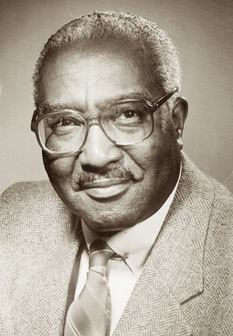

A publication of The Graduate School, University of North Carolina at Chapel Hill
Archives Spring 2001
Home | Back issues | About us | Email your feedback | The Graduate School | UNC-Chapel Hill | Make a gift
Carolina's First Black Ph.D. Graduate
 |
| Photo courtesy of William Darity |
| Alumnus William Darity remembers a different campus in days past. |
Dr. William Darity was the first African American to earn his Ph.D. from the University of North Carolina at Chapel Hill, an honor no one else can claim. But Darity does not harp on his accomplishment. Rather, he remembers a time when the University did not revel in the diversity that exists on campus today.
Darity graduated with a Ph.D.
in public health in 1964, a time still wrought with racial discrimination.
“The University stood for over 175 years before it granted a black
a Ph.D.,” and it was clearly past time to provide education to all
races, he said.
Indeed, Carolina was a different place in the ‘60s, with very few black and female students. Discrimination was a problem not only in Chapel Hill, but all over the country. “You couldn’t eat in the restaurants,” he explained. “It was not a very pleasant situation until later, after some things changed while we were there. My wife was involved in opening up theaters, for instance.”
Darity said he was lucky in
those days — he was well equipped to join a university world where
there were only a few black students. “The whole social situation
was not as difficult as people might think it was, because I had worked
for The World Health Organization, overseas. Coming back into the situation
where there were few blacks — well, I’d worked in various countries
in the world where there were no black Americans.”
The most difficult thing for
Darity, he said, was worrying about his children. “They had to face
so many problems,” he said. “My son was one of the first blacks
to go to a predominantly white school, and my daughter went also, when
she was old enough.” Darity’s son, William (Sandy) Darity, Jr.,
apparently flourished, despite the challenges of the time: He is now a
professor of economics at UNC-Chapel Hill.
In contrast to Carolina’s
diverse campus today, Darity said there were no organized black student
groups while he was in graduate school. Darity relied upon his friends
for support — four of whom were his undergraduate associates at Shaw
University. “That was one of the helpful things that happened just
incidentally,” he said. “We helped one another and visited one
another.”
Darity said he never felt animosity
due to his race from the other students and most of the professors. “I
was treated just like any other graduate student,” he said. “I
sat in class and studied like everyone else. There was no exception to
the rule.”
Darity flew through his program
in public health — normally a three-year curriculum — in only
two years. “I was married with kids — I didn’t have time
to play,” he said. “My wife was very supportive. I stayed right
there on that campus in the laboratories and in the library. I didn’t
have any family backup financially, so I had to get through.”
Now a retired professor emeritus
of public health at the University of Massachusetts at Amherst, Darity
is an active decision-maker with the University of North Carolina at Chapel
Hill. He is a member of the Graduate Education Advancement Board of the
Graduate School, a member of the Board of Visitors, and a former member
of the UNC-Chapel Hill Board of Trustees.
Darity also is a donor to the
Graduate School. “I became a donor because I felt that UNC contributed
to my success. I’m also setting up a small scholarship in my mother
and father’s name,” he said.
On his frequent visits to campus,
Darity said he looks forward to seeing progressive changes that have taken
place. “When I was there, there might have been 20 black undergraduate
students, if there were that many. They didn’t take women in the
freshmen or sophomore classes then, and there were not many minorities
then at all.
Along with numerous other advancements,
he concluded, “That’s changed.”
-Nadia R. Watts
© 2002, The Graduate School, The University of
North Carolina at Chapel Hill
All text and images are property of The Graduate School
at the University of North Carolina-Chapel Hill. Contact Sandra Hoeflich
at shoeflic@email.unc.edu
to request permission for reproduction.
Contact Alexandra Obregon at aobregon@email.unc.edu if you have technical problems with this Web site.